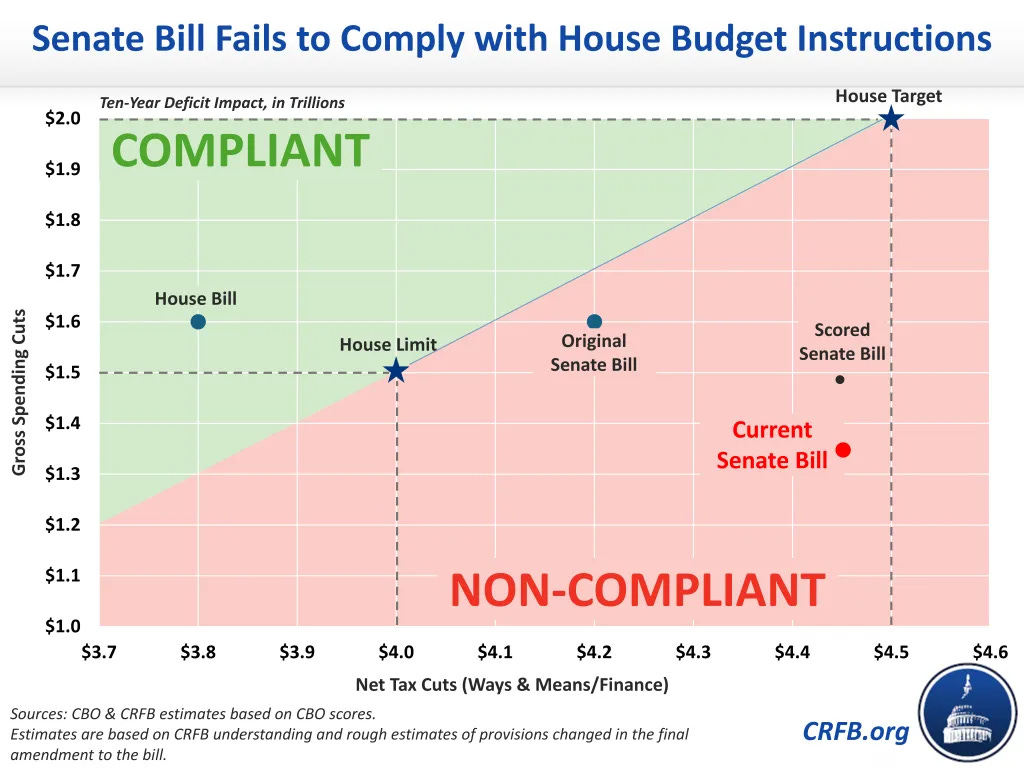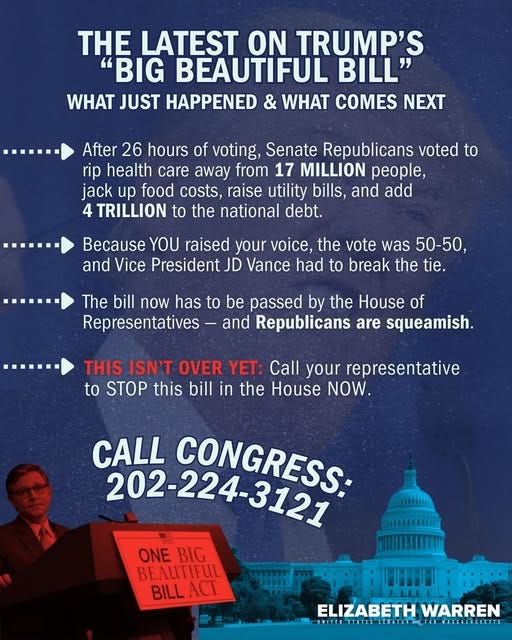The "One Big Beautiful Bill Act" (OBBBA), has passed in the Senate, is poised to dramatically reshape the American landscape, with significant implications for the nation as a whole, and particularly for "red states" and individuals reliant on healthcare assistance like Medicaid (CBS News, 2025; Al Jazeera, 2025a; KFF, 2025; Wikipedia, 2025). This complex piece of legislation, far from being universally welcomed, has generated considerable controversy and opposition, even from within its own party (Al Jazeera, 2025b; Mother Jones, 2025; POLITICO, 2025).
At its core, the OBBBA aims to extend certain tax cuts from 2017 and includes increased spending on border security, defense, and energy production (CBS News, 2025; Al Jazeera, 2025a; Wikipedia, 2025). However, these provisions are largely offset by substantial cuts to healthcare and nutrition programs (CBS News, 2025; Al Jazeera, 2025a). The Congressional Budget Office (CBO) estimates that the bill could add trillions to the national debt and lead to millions of Americans losing their health insurance coverage (KFF, 2025; Wikipedia, 2025).
Impact on States and Vulnerable Populations:
The proposed cuts to Medicaid are a central and deeply concerning aspect of the OBBBA (Al Jazeera, 2025b; Georgetown University Center for Children and Families, 2025; KFF, 2025; Health Affairs, 2025; Yahoo News, 2025; CBS News, 2025; POLITICO, 2025). For states, especially those that have expanded Medicaid coverage under the Affordable Care Act (ACA), the bill could lead to significant financial strain. The legislation proposes measures such as imposing work requirements on expansion adults, requiring more frequent eligibility redeterminations, and introducing copayments for certain services (Georgetown University Center for Children and Families, 2025; KFF, 2025; Yahoo News, 2025). It also seeks to reduce federal matching rates for states that provide care to undocumented immigrants (KFF, 2025; Georgetown University Center for Children and Families, 2025; Yahoo News, 2025). These provisions are projected to cause millions of low-income adults to lose Medicaid coverage, shifting the burden of care onto providers and local communities (Georgetown University Center for Children and Families, 2025). This will result in healthcare facilities closing in rural areas and healthcare costs rising for all Americans as the cost of providing emergency care for low-income adults will be shifted to Americans who have healthcare insurance.
In addition to jeopardizing access to essential medical care, cuts to Medicaid will inevitably increase overall healthcare costs for everyone. When individuals lose coverage and delay care due to cost, they often end up in emergency rooms—the most expensive setting for treatment. These uncompensated costs are ultimately shifted to hospitals, insurers, and taxpayers, resulting in higher premiums and medical costs across the board. What appears to be a “savings” to the federal budget is in fact a cost transfer to states, communities, and families.
For "red states," which may have a higher proportion of residents relying on Medicaid, these cuts could be particularly devastating (CBS News, 2025; Georgetown University Center for Children and Families, 2025). The impact on individuals with chronic conditions, such as Parkinson's disease, whose care is often dependent on comprehensive Medicaid benefits, would be severe. For instance, an elderly mother-in-law with Parkinson's disease, whose care is already a significant concern, would find her situation "extremely compromised" by any reduction in Medicaid funding (CBS News, 2025). This is not merely an abstract policy debate; it is a matter of direct, human impact, affecting the ability of families to provide essential care for their loved ones (Georgetown University Center for Children and Families, 2025).
Most Interesting and Disgusting Aspects:
Beyond the profound impact on healthcare access, the OBBBA contains provisions that are both intriguing and, frankly, disgusting. The bill's structure, which balances tax cuts for the wealthy with cuts to social safety nets, has been widely criticized as a redistribution of wealth from the poor to the rich (Al Jazeera, 2025b; Mother Jones, 2025; Georgetown University Center for Children and Families, 2025). The fact that such significant cuts to essential programs are being enacted to fund tax breaks for the most affluent is a stark illustration of misplaced priorities (Mother Jones, 2025; POLITICO, 2025; Georgetown University Center for Children and Families, 2025).
Worse still, these tax breaks for the wealthy are not being paid for—they are being financed through deficit spending. The CBO projects that the bill could add trillions to the national debt (KFF, 2025; Wikipedia, 2025). This ballooning debt increases the government's borrowing needs, placing upward pressure on interest rates for all Americans. As a result, ordinary citizens may see increased costs on everything from mortgages and car loans to student loans and credit cards. In short, average Americans may not only lose vital social services but also end up paying more out-of-pocket across their financial lives—while the wealthiest reap windfall tax benefits.
Furthermore, the legislative process itself has been marred by accusations of rushed maneuvering and a lack of transparency, with Democrats attempting to force a full reading of the bill due to its extensive nature and the speed at which it's being pushed through (Al Jazeera, 2025b; Mother Jones, 2025; POLITICO, 2025). This "cloak of darkness" approach, as described by critics, only deepens the suspicion surrounding the bill's true intentions and its potential to harm vulnerable populations (Al Jazeera, 2025b). The inclusion of specific provisions, such as tax breaks for whalers seemingly aimed at securing a particular senator's vote, also highlights the pork-barrel nature of some legislative deals (Fox News, 2025).
A Call to Action:
The "One Big Beautiful Bill Act" represents a critical juncture for the nation's social contract and the well-being of its most vulnerable citizens. The potential for millions to lose health coverage, the increased burden on states, and the systemic weakening of safety nets are not abstract consequences; they are direct threats to the health and financial security of families across America.
We must not stand idly by while essential programs are dismantled. It is imperative that every American, especially those in "red states" and those who directly benefit from or care for individuals reliant on Medicaid, make their voices heard.
Contact your elected officials. Demand that they prioritize the health and well-being of all Americans, not just the wealthy. Urge them to reject this bill in its current form and to work towards solutions that strengthen, rather than dismantle, our social safety nets.
Educate yourselves and others. Share information about the true impact of the OBBBA. Let your communities know what is at stake.
Vote. In every election, support candidates who champion accessible healthcare and a robust social safety net.
The future of healthcare and the security of countless families depend on our collective action. Let us ensure that our government truly works for the benefit of all, not just a privileged few.
References:
Al Jazeera. (2025a, June 30). US Senate begins debate on Trump’s ‘Big, Beautiful Bill’. https://www.aljazeera.com/news/2025/6/30/us-senate-begins-debate-on-trumps-big-beautiful-bill
Al Jazeera. (2025b, June 29). Senate Republicans vote to advance Trump’s ‘Big, Beautiful Bill’. https://www.aljazeera.com/news/2025/6/29/senate-republicans-vote-to-advance-trumps-big-beautiful-bill
CBS News. (2025, June 30). Senate holds marathon vote series on Trump's "Big Beautiful Bill" as GOP eyes July 4 deadline. https://www.cbsnews.com/news/senate-debate-trump-one-big-beautiful-bill/
CBS News. (2025, June 30). Here's what's in Trump's "big, beautiful bill" as Senate nears a final vote. https://www.cbsnews.com/news/whats-in-trump-big-beautiful-bill-senate-version/
Fox News. (2025, June 29). House Freedom Caucus members say Senate changes spell doom for Trump tax bill. https://www.foxnews.com/politics/house-freedom-caucus-targets-trumps-big-beautiful-bill-concerns-about-budget-deficit
Georgetown University Center for Children and Families. (2025, June 26). One Big Beautiful Bill Act: Winners and Losers in the Medicaid Provisions. https://ccf.georgetown.edu/2025/06/26/one-big-beautiful-bill-act-winners-and-losers-in-the-medicaid-provisions/
Health Affairs. (2025, June). Senate GOP Makes Last-Minute Health Care Changes To Budget Bill Ahead Of Scheduled Motion To Proceed. https://www.healthaffairs.org/content/forefront/senate-gop-makes-last-minute-health-care-changes-budget-bill
KFF. (2025, June). KFF Health Tracking Poll: Views of the One Big Beautiful Bill. https://www.kff.org/medicaid/poll-finding/kff-health-tracking-poll-views-of-the-one-big-beautiful-bill/
KFF. (2025, June). What Could the Health-Related Provisions in the Reconciliation Bill Mean for Older Adults? https://www.kff.org/medicare/issue-brief/what-could-the-health-related-provisions-in-the-reconciliation-bill-mean-for-older-adults/
Mother Jones. (2025, June). Ordinary Republicans Hate Trump’s “Big, Beautiful Bill” Once They Know What It Does. https://www.motherjones.com/politics/2025/06/trump-big-beautiful-bill-polling-unpopular-republicans-yale-study/
POLITICO. (2025, June 28). Warner predicts Trump's 'Big Beautiful Bill' will cripple GOP support - Live Updates. https://www.politico.com/live-updates/2025/06/28/congress/warner-predicts-megabill-will-cripple-gop-support-00431479
Truthout. (2025, June). Democrats Force Reading of GOP’s “Big, Beautiful Bill” After Key Senate Vote. https://truthout.org/articles/democrats-force-reading-of-gops-big-beautiful-bill-after-key-senate-vote/
Wikipedia. (2025, June). One Big Beautiful Bill Act. https://en.wikipedia.org/wiki/One_Big_Beautiful_Bill_Act
Yahoo News. (2025, June). What will Trump's 'big, beautiful bill' do to Medicare and SNAP? https://www.yahoo.com/news/trumps-megabill-programs-medicare-snap-162442046.html





